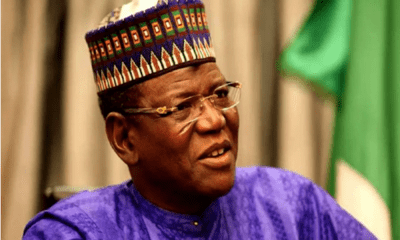Editorial
Insecurity & the call for Mercenaries: A sign of distress the Government must rise to address
As it appears the Nigerian Government is lying handicapped with security forces apparently frustrated and fatigued, recent call for employment of mercenaries to fight the die hard hydra-headed insurgency in the Country has become another call gathering cloud of attractions. Killings in tolls have recently become an albatross sending sense of panic across the Country. As the scourge grows with wider network offsetting the Country, the outcries for intervention have not left out the suggestion of engaging mercenaries to fight the scourge of insurgency in the Country.
Such call has been premised on the apparent loss of bearing on the part of the Government, amidst the frustration and fatigue of security forces. Civil rights advocacy group, the Human Rights Writers Association of Nigeria (HURIWA) had on Monday, the 8th of August, 2022, called on President Muhammadu Buhari, to engage mercenaries to complement military’s fight against terrorists’ onslaught. According to the group, any resistance to such is ‘suicidal.’ This trailed lamentable records of the killing of no less than 750 soldiers in the space of last two years by insurgents.
At a press briefing in Abuja, HURIWA’s national coordinator, Emmanuel Onwubiko, had described as unprecedented the rate at which terrorists of the Boko Haram and Islamic State – West Africa Province kill soldiers in the last two years. The group, therefore, had urged the Federal government to go beyond condemning terrorists’ onslaught against the military and take decisive and quick actions to run all criminal elements out of the nation’s shores. The group had said: “The President as the Commander-In-Chief of the Armed Forces must strategise the anti-terrorism war because apparently, the troops are losing with hundreds of them having had to pay the supreme price in the last two years. A recent report put the figure of soldiers fell by terrorists at 750 soldiers between the third quarter of 2020 and July 2022. This is unacceptable. The President must with immediate effect reshuffle the security architecture and sack the service chiefs whose lack of effective leadership have cost over 750 families their beloved brothers, sisters, and breadwinners. The President must ensure that the morale of the soldiers still alive is boosted through the timely payment of salaries, acquisition of modern-day superior weapons as soldiers in leaked videos have decried the absence of superior firepower to their adversaries, payment of entitlement to families of fallen heroes, amongst others.
“Also, the engagement of foreign mercenaries cannot be over-stressed. As buttressed by the Chairman of the House of Representatives’ Committee on Defence, Babajimi Benson, the Armed Forces are overstretched as they are now engaged in internal security operations which should have been led by the Nigeria Police Force. The deployment of foreign mercenaries is exigent to avoid the further loss of military personnel. Any resistance to this is suicidal. Similarly, the Minister of Police Affairs, Muhammad Dingyadi, had on December 15, 2021 said that the federal government approved a 20 per cent increase in salaries for personnel of the Nigeria Police Force, effective January 2022 but police officers have been crying out that the raise had yet to take effect even eight months after. The President must ensure policemen get the necessary morale booster to fight internal security for soldiers to face Boko Haram and Islamic State in West African Province, ISWAP fighters.
“Also, the federal government must with immediate effect, give licence to regional security outfits in the South-East, the South-West and Benue state for these vigilante men to bear arms to consolidate the operations of the military and the police as the army and the police are overstretched with many attached to Very Important Personalities and politicians instead of securing the country against internal and external threats.”
It is indisputable that the centralisation of control of security forces in the Federation has failed to address localised security menaces. The gap in policing has left behind lacuna which has given ample chance for insecurity threats to grow. As the prevailing security architecture fail to address internal insurrection of insurgency, even with the engagement of the military, it is not out of place that suggestions on the best possible means to address the prevailing challenges would be expected. The call for the engagement of mercenaries to augment efforts of the Nigerian military fighting the scourge of insurgency in the Country, constitute one candid reflection of such. It appears that even from constituted authorities, similar calls have been rolling out recently, as frustration visits offices bearing the burden of leadership in the Country. Such frustration has been particularly expressed by subnational seats, States in particular, which are more or less handicapped over insecurity threats, particularly those amidst the heat of forceful grip of terror scourge. It would be recalled that with the spate of attacks on the State, the Kaduna State Governor, Nasir El-Rufai, had following the March 28, 2022, attack on the Abuja-Kaduna-bound train vowed to, with other State Governors in the Northwest, hire foreign mercenaries to fight against terrorists. According to him, four others of the seven Northwestern State Governors—Katsina, Zamfara, Kebbi, Sokoto—may join him to hire foreign mercenaries if the Federal Government fails in its duty to end the ongoing spate of terror attacks in the region.
El-Rufai who then spoke to State House correspondents after he visited the President Muhammadu Buhari at the Presidential Villa, Abuja, to update him on the happenings since the train attack, was quoted, “Why do we always wait for them to strike before we go after them? Why can’t we go to where they are and kill them? We know where they are. We have the maps as the military knows, the policemen know and everyone knows. The DSS is giving us a report every time: see where Dogo Gide is, see what he is planning. Why is it that up till now, the security operatives has not gone to kill them? Where are our soldiers? Why have they not done it? That is why I have come to see Mr President. And also I have said that if these actions are not taken, it becomes a must for us as governors to take measures to protect our citizens, even if it means we will import mercenaries from outside the country to do it. If our soldiers fail, I swear to God, we will do that.”
The frustrations have appeared too engulfing that only a rejigging of security response to the scourge of insecurity in the Country is much required. The call for engagement of mercenaries may not be out-ruled from the options, but would not certainly in its entirety constitute all that may be needed for a formidable architecture to ravage the network of the hydra and hard headed insecurity scourge which has grown its expansive wings with destabilising forces. Other measures having to do with internal redefinition of the overall orientation of security forces to give overhauling ambience for systemic appeals formidable enough to respond to the prevailing turbulence in the Country, is pertinent. Such redefinition would have to be encompassing in coverage, from the framework of the hard and soft parameters of the security forces, the intelligence base, human resources, the orientation, patterns of operations, and arsenals, among others.
It is indisputable that the shortfalls in the systemic profile of the security forces in the Country is too entangled with strings which grip have been too pronounced to leave behind a debilitated force, now reflecting the fatigue of deepened weaknesses of security architecture which over the years have been left unaddressed.
Now, that the scourge of insecurity in its various expressions have become an albatross melting the fabrics of the Country, the necessity to rejig the framework of the security architecture in the Country is sine qua non. The threats of the scourge have become too pronounced that the Federation itself is threatened. Recent threats of bandits declaring their mission to kidnap the President, Governor of Kaduna State, among other high profile Nigerian public office holders, sound alarm of such threats. Attempts on convoys of key public office holders, including governors recently, reflect how determined and calcified these elements are in their agenda. It would not be out of course to state that the Government, with much emphasis on the central, majorly based on its unreleased embrace on its preserve to controlling the security forces, must wake from the apparent passive disposition to what has become a threat to the existence of the Federation.
Editorial
Nigerians groan under high cost of living


Barely fourteen days to the first year anniversary of this federal government, Nigerians have continued to groan under high cost of living, amidst a catalogue of failed promises. Despite its chants of ‘Renewed Hope Agenda,’ a cup of garri/rice has since gone out of the reach of an average Nigerian. There is a continuous hike in fuel and other petroleum products. Transportation fares, local, inter-state or international are a no-go area. Nigerians have lost count of pledged dates for the commencement of operations or production of our refineries, especially Port Harcourt Refinery.
Most citizens have lost hope in the current political leadership in the country. Fuel today is being sold at between N800 to N950 per litre and still counting. A bottle of kerosene is about N2,000 and this an essential product being used by almost 90 percent of the population, especially the lower cadre. In the past, the colour of kerosene used to be like spring water from a rock, but today the product is sullied with impurities, its colour of kerosene almost like that of groundnut oil. Yet, it remains scarce and costly. What a country.
Nigeria is possibly the only country with abundant crude oil deposits that prefers to throw away the crude at giveaway price to other countries in the name of exportation, only to buy the refined products from the crude at exorbitant prices, in the name of importation. The first refinery in Port Harcourt was built about nine years after oil was discovered in commercial quantity in Oloibiri in 1956 in the present day Bayelsa State. And up till today there is no intentional attempt to rebuild it, or be religious in maintaining it.
The Naira debuted as the national currency of Nigeria, at 75K to $1, but today N1,500 is exchanging $1. Yet, we are ranked among the highest producers of oil and gas in the comity of nations. The unadulterated truth is this: Nigerians are suffering in the midst of plenty which should not be the case.
The poor leadership of the old brigade, who have held sway since independence, should leave the stage for younger generation. The current President of France, Emmanuel Macro is below forty years. The recent election in Senegal produced a 44-year-old man as president. Whether we like it or not, once a person passes retirement age of 60, his mental faculty starts dropping.
Inflation rate is now 33-35% in the country. Unemployment rate is soaring and the Federal Government had the gut to propose N48,000 as minimum wage for Nigerian workers, possibly as part of the ‘renewed hope agenda.’ This is as against N860,000 being proposed by the organised labour, comprising the Nigeria Labour Congress (NLC) and Trade Union Congress(TUC).
We are not surprised therefore when the organised labour walked out of the negotiation table and handed down a 14-day ultimatum to the Federal Government to think right.
We hope the federal government will really do all it needs to do to avoid another showdown with Nigerian workers who are like wounded lions and have been patient enough with the economic torture currently being experienced by workers in the country. We hope and pray that the tail of a sleeping tiger, will not be unnecessarily pulled. It could amount to unpleasant consequences. The government should fulfil its campaign promises and ensure peace and tranquility throughout the nation.
Editorial
Minimum wage Saga: FG, let the people go…


For years, the narrative has been the same — the economy withers and the common man cries out for reprieve, only to be met with an endless array of impediments. When it is time to intercede for the poor, Nigerians are met with pointless bureaucracy and palliatives. Foreign aid is rendered ineffectual thanks to the gauze-hand of leaders, through which it all slips through into an oblivion of their own invention.
In April 2024, the headline inflation rate rose to 33.69 percent, up from 33.20 percent in March 2024, marking an increase of 0.49 percent points according to the Nigeria Bureau of Statistics (NBS). Yet, to raise the minimum wage to a level that will help beat back hunger in the poorest families has become a problem for the government.
Per the International Monetary Fund, IMF, a determined and well-sequenced implementation of government’s policy intentions would pave the way for faster, more inclusive, resilient growth in Nigeria. Without reforms — such as raising the minimum wage — to enhance the business environment, improve security, implement key governance measures, develop human capital, boost agricultural productivity, Nigeria’s growth potential will never leave the realm of imagination.
“These reforms are crucial to boost investor confidence, unlock Nigeria’s growth potential and diversify the economy, and address food insecurity, and underpin sustainable job creation,” IMF noted in its recent report, adding that over the last decade, limited reforms, security challenges, weak growth and now high inflation had worsened poverty and food insecurity in Nigeria.
“While Nigeria swiftly exited the COVID-19 recession, per-capita income has stagnated. Real Gross Domestic Product (GDP) growth slowed to 2.9 percent in 2023, with weak agriculture and trade, and in spite of the improvement in oil production and financial services.
“Growth is projected at 3.3 per cent for 2024 as both oil and agriculture outputs are expected to improve with better security. The financial sector has remained stable, in spite of heightened risks. Food insecurity could worsen with further adverse shocks to agriculture or global food prices. Adverse shocks to oil production or prices would hit growth, the fiscal and external position, and exacerbate inflationary and exchange rate pressures,” the IMF said.
Yet, on Wednesday the pattern continued. Negotiations reached a deadlock due to the government’s perceived unwillingness to engage in fair discussions with Nigerian workers. The NLC National President, Joe Ajaero, in a sense is right to say that the government’s proposal of N48,000 as the new minimum wage is an insult to Nigerian workers.
It is no surprise that the labour unions are demanding a higher minimum wage to reflect the current economic realities and alleviate the suffering of Nigerian workers. The stalemate in negotiations may lead to industrial action, which could have far-reaching consequences for the economy.
Many labour in vain for decades for peanuts, only to be denied their pensions in old age. Of course, the Nigerian worker will down his tools in the face of great poverty, and seeming apathy from the government. The relationship between wage rate and employment is well established. Most revolutions throughout the world are dependent on the satiation of the labour force. The Federal Government should maintain an atmosphere of charity and responsibility. Like the Israelite Moses said millennial ago, let our people go.
Editorial
Inflation as major threat to life security


Millions of Nigerians are groaning because of the devastating inflationary pressure that is making it impossible for many to consume the minimum calories required for a healthy living.
It is known that Nigeria’s macroeconomic environment has become very harsh in its diminutive impact on the purchasing power at the disposal of the citizenry.
Many cannot also conveniently afford to transport themselves to their workplace or move around for routine activities.
Meanwhile, the price of other payment obligations for services such as house rents, school fees, utilities (including cable television), health and recreation services are rising on a daily basis.
This shows that the quality of life enjoyed by Nigerians is deteriorating as poverty becomes more pervasive and endemic.
According to official statistics, the November inflation rate was 14.89 percent and it is fast heading towards the 15 percent mark.
Meanwhile, the Rural inflationary pressure is also climbing as the rate climbed to 12.28 percent in July even when the price of Premium Motor Spirit and electricity tariff had not been hiked. Prices are just rising freely.
This applies to production inputs (except labour), consumer durable, agricultural products as well as services.
This unfortunately is the case irrespective of the basket of goods one uses as a measure outside the standard yardstick.
A close look at the policy framework of the government shows that the recent surge in general price level is not unconnected with structural bottlenecks, fiscal and monetary policies, deregulation, and trade policies as well as inefficiency on the part of regulatory agencies.
The government has for too long paid lip service towards unbundling of the shackles of growth and development such as poor budgetary implementation on capital projects, outdated laws and a toxic business environment that constrain the economy.
This has indeed, slowed down economic growth and resulted in shortage of goods and services and their attendant impact on inflation.
The government seems to be heating up the system by keeping its spending open-ended even as it cries of inadequacy of revenue to finance its expenditure obligations.
The disconnect between recurrent account, capital account and public debt operations is certainly having a destabilising effect on public finance operations of the country.
This has given rise to fiscal domination that describes the aggregative impact of the uncoordinated expenditure activities of all the governments in our strange three-tier federal arrangement.
It also appears that the Central Bank is losing sight of its inflation-targeting monetary policy which has been on its front burner for more than two decades now.
This is certainly not what the nation needs now when virtually all the macroeconomic variables are in disarray.
Here, attention of CBN must be called to its Naira management policy especially as it affects the regimented devaluation and depreciation which impact heavily on the domestic and external value of the currency.
The external value requires attention considering that the Nigerian economy carries a monolithic production base and import orientation.
The gross loss in the value of Naira is having a horrible impact on the life of Nigerians as misery and hopelessness characterise the daily songs of the lower income strata and whatever is left of the middle class.
It must be pointed out also that the government policy on agriculture in general and rice production appears to suffer a backlash.
Whereas local production has increased appreciably the farmers and agricultural marketers are engaging in exploitative pricing practice.
They simply jack up their prices arbitrarily. This is particularly the case with respect to rice where the price of the local varieties is at par with the foreign brands.
The recent increase in the price of premium motor spirit and electricity tariff have surely added more salt to the injury.
These two products are directly tied to production and distribution of goods and services and as such raising their individual prices simply translates to increasing the price of everything that is bought and sold in the open and underground economies.
Unfortunately, all these are happening when the nominal income of the average citizen has either stagnated or declined as the minimum wage has not been paid by many states of the federation.
The same is characterised by controversy in those states and some federal agencies that have implemented the new salary regime.
-
Finance4 months ago
Court orders Sen. Victor Umeh to repay N136m bank debt to AMCON
-



 Abuja Update3 months ago
Abuja Update3 months agoUNDP, FG partnership needed to achieve inclusion, equity- Minister
-
Abuja Update2 months ago
Banks drive stock market performance with N147bn gain
-
capital market2 years ago
Rt.briscoe, FBNH, Others halts negative performance of stock market
-
Submission Guidelines4 months ago
CALL FOR SUBMISSIONS: POETRY COLUMN-NND
-



 Health1 month ago
Health1 month agoCapacity training will reduce migration of health workers- NPHCDA
-



 Business4 weeks ago
Business4 weeks agoTingo Group unveils Tingo Electric, Tingo Cola drink at Lagos launch
-
News5 months ago
Oil thieves sponsoring malicious media campaign against Navy – Spokesman
















